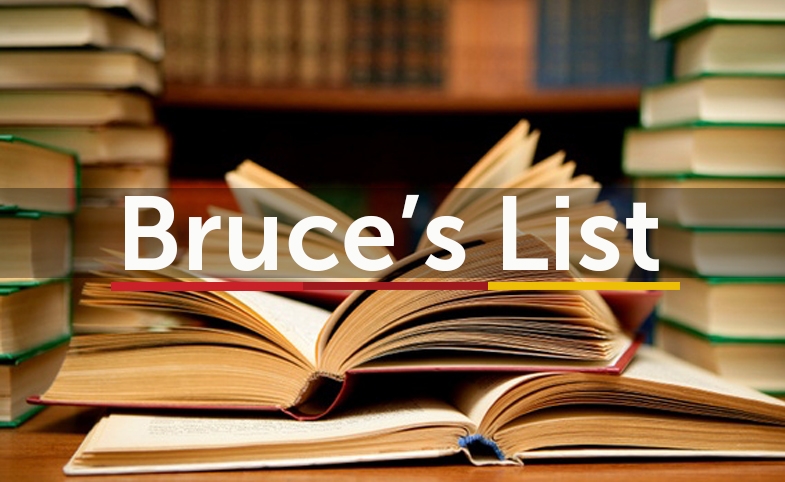The October 2016 edition of Bruce Gregory's public diplomacy reading list is now available. Known affectionately at CPD as "Bruce's List," this list is a compilation of books, journal articles, papers and blogs on a wide...
KEEP READING
December's Public Diplomacy Must-Reads
The December 2016 edition of Bruce Gregory’s public diplomacy reading list is now available. Known affectionately at CPD as “Bruce’s List,” it is a compilation of books, journal articles, papers, and blogs on a wide variety of PD topics, and features a number of CPD scholars. Highlights in this edition include:
Jan Melissen and Matthew Caesar-Gordon, “‘Digital Diplomacy’ and the Securing of Nationals in a Citizen-Centric World,” Global Affairs, DOI 10: published online October 21, 2016. Melissen (Netherlands Institute of International Relations, Clingendael, University of Antwerp) and independent scholar Caesar-Gordon explore central issues in how ministries of foreign affairs (MFAs) are adapting to the “digital shift” in what has become a dominant priority in their contact with publics—consular assistance to their nationals abroad. Their thought-provoking assessment divides into four areas of inquiry: (1) how MFAs, resistant to technological innovation, are coping with rising citizen demand for assistance in an online world; (2) ways in which lack of capacity, insufficient reliable data, and a more networked “duty of care” foster collaboration with the non-governmental sector; (3) how growing MFA uses of social media and digital tools, driven by citizens, make consular services more dependent on citizen participation; and (4) general observations that citizens abroad should take greater responsibility for their security and on how digitization is changing relations between MFAs and domestic society in the context of broader societal trends. Although their article focuses on MFA’s and their own nationals abroad, its implications are broader: to what extent do MFAs have an appropriate networked “duty of care” for neighbors and strangers in a world where the UN Refugee Agency records some 65.3 million people are displaced by conflict and persecution?
Jessica Gienow-Hecht and Carolin Viktorin, “Gienow-Hecht and Viktorin on Jimenez and Gomez-Escalonilla and Cull - ‘US Public Diplomacy and Democratization in Spain: Selling Democracy?'” H-Diplo, December 2016. Gienow-Hecht and Viktorin (Freie Universitat Berlin) have written a thoughtful and positive review of U.S. Public Diplomacy and Democratization in Spain: Selling Democracy? (Palgrave Macmillan, 2015), a collection of essays compiled by Francisco Javier Rodriguez Jimenez (University of Salamanca), Lorenzo Delgado Gomez-Escalonilla (Center for Human and Social Sciences, Madrid), and Nicholas J. Cull (University of Southern California). The reviewers place the book in the context of Spain’s “slippery status” in Cold War historiography and frame its focus on a central question: did U.S. public diplomacy in Spain serve democratization or simply mask U.S. military strategy?
Nigel Cliff, Moscow Nights: The Van Cliburn Story – How One Man and His Piano Transformed the Cold War (HarperCollins Publishers, 2016). British historian and biographer Nigel Cliff’s recounts how Van Cliburn, a 23-year old Texas prodigy, improbably won the Soviet Union’s first International Tchaikovsky Competition in 1958. In contrast to earlier works, which focused more on the music, Cliff explores what his achievement meant in the context of diplomacy during the early Cold War—years in which the US and Soviets were competing in the arts as well as in space, armaments, and geopolitics. Cliff’s subtitle may overstate, but his narrative is a well-written case study of American soft power.
Walter R. Roberts, The Compleat Public Diplomat, (Kindle Edition, 2016). This collection of articles and reflections by a leading scholar and practitioner of U.S. public diplomacy was edited by Barry Fulton, Chair of the Walter Roberts Endowment at George Washington University’s Institute for Public Diplomacy and Global Communication. It was published on the 100th anniversary of Roberts’ birth. The collection includes articles by Roberts on the evolution of diplomacy, his perceptive 1994 speech on public diplomacy entering the internet age at the UK’s Royal Academy of International Affairs, essays on U.S. international broadcasting, articles on Roberts’ roots and emigration from Austria, and his recollections on Yugoslavia’s Tito. The collection also includes a forward by General Brent Scowcroft, reflections by U.S. Ambassador Jock Shirley, and an afterword by Barry Fulton.
The full list is available here.
Visit CPD's Online Library
Explore CPD's vast online database featuring the latest books, articles, speeches and information on international organizations dedicated to public diplomacy.
Popular Blogs
-
January 29
-
January 20
-
December 17
-
January 28
-
December 15











